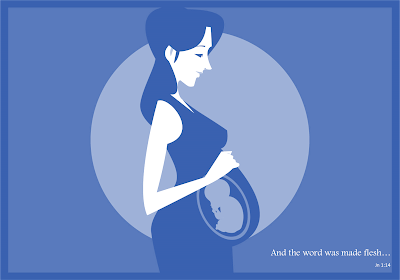ANNUNCIATION OF THE LORD: TO THE GENESIS OF LIFE.
March 25 2020: Solemnity of the Annunciation of the Lord
A Congolese proverb says, “Children are the reward of life.”
Another Tibetan proverb adds, “Who saves a life, saves the whole world.”
Today’s solemnity marks the starting point of a mystery
which will be fully manifest in nine months, the Mystery of Incarnation. God,
today, becomes man into the womb of a humble Virgin. At the Annunciation, the
Archangel Gabriel reveals to Mary God’s plan on her life. To that project, Mary
gives her “Fiat voluntas tua!” (Thy will be done), and in her humility, she
conceives the Son of God, the Savior of humanity, by the power of the Holy
Spirit. At the very moment of Mary’s consent to God’s will, the Son of Man
started his being as a man.
One of the most beautiful lessons we can learn from the
mystery of the Annunciation is about “where and when does life start?” This is
also one greatest bioethics’ questions. When is the real beginning of life? At
which moment can a fetus be called a human being? Through these questions, we
raise a concern on many social and actual political and medical questions,
among which that of abortion and the genetic manipulation of human embryonic
stem cells.
The Catechism, about the Annunciation, says, “The
Annunciation to Mary inaugurates "the fullness of time", the time of
the fulfillment of God's promises and preparations. Mary was invited to
conceive him in whom the "whole fullness of deity" would dwell
"bodily".” That fullness of time here mentioned is nothing else than
the start of God’s life as a human being. So, life starts at that first minute
of the conception and it is life in its fullness. Fetus or embryos are not
half-human beings. They are fully man, with all that it means to be a man, deserving
of the same rights and respect we enjoy.
The readings proposed to our mediation lead us to reflect on
the mystery of incarnation, its prophetic announcement through Isaiah to King
Ahaz and its completion in Mary. Through Isaiah, the Lord God announces to Ahaz
the sign of the virginal conception: “the virgin shall be with child, and bear
a son, and shall name him Emmanuel, which means “God is with us!”
The Lord God chose to be with his people, and he did it
under the ciphers of a little child. This started at conception. From that time
of the childbearing of the virgin, God was with his people. Under the marks of
the unborn child, it is God being with mankind, with his full image and
likeness.
The fulfillment of that prophecy made to Ahaz needs the
consent of man, that is our disposition and openness to do God’s will. We all
are called to be able to say like the Psalmist, “Here I am, Lord; I come to do
your will.” The author of the Letter to the Hebrews emphasizes it the more. God
needs human approval, our “Fiat voluntas tua” for him to become one of us.
The Gospel teaches us that we have got a representative.
Mary, on the behalf of the whole humanity, said that “Fiat”: “Behold, I am the
handmaid of the Lord. May it be done to me according to your word.” After what,
God became one of us.
God’s Son, incarnates into the womb of the Virgin of
Nazareth is one of us and one with us (Emmanuel), from that very moment of the
Annunciation. Children also are “one of us” from the first hour of conception.
Abortion in that sense becomes a denial of their rights. It is a refusal to
God, of his right to be born in our likeness. God needs our yes. When we give
our consent to abortion or any law allowing genetic manipulation of human
embryonic stem cells, we are like saying “No” to God’s request to be with us.
Through the practice of Abortion, how many “Emmanuel” we exterminate under the
cover of the law, while their coming was to bring about the same joy Elisabeth
and John felt at the visitation of Mary and Jesus.
The mystery of the incarnation is a mystery of joy, just
like every new conception is a cause of joy. God coming to be with us calls us
to love him through his Incarnate Son. This mystery calls us also to show more
love for children and mostly to the unborn.
In a world strived by so many negativist laws on life, a
world where human life is in loss of value, reflecting on God’s Incarnation
sounds like a strong warning. We are called to be pro-life and make ours the
basic principles of bioethics: respect for autonomy, non-maleficence,
beneficence, and justice. It is all about respecting the principle of the
autonomy of each life, starting with the fetus, from the first moment of the conception
till the natural death. The principle non-maleficence, that is, to prevent
oneself from inflicting any pain unto life, and mostly the life of defenseless
and vulnerable people. The principle of beneficence, that is, to show kindness
and love to all human beings. Do Orione would say, to “do good to all.” And
lastly, the principle of justice: to treat all beings as if we were acting with
ourselves.
May God, coming to be with us (Emmanuel), elevate our
awareness of these basic principles for the betterment and humanization of our
world.





Comments
Post a Comment